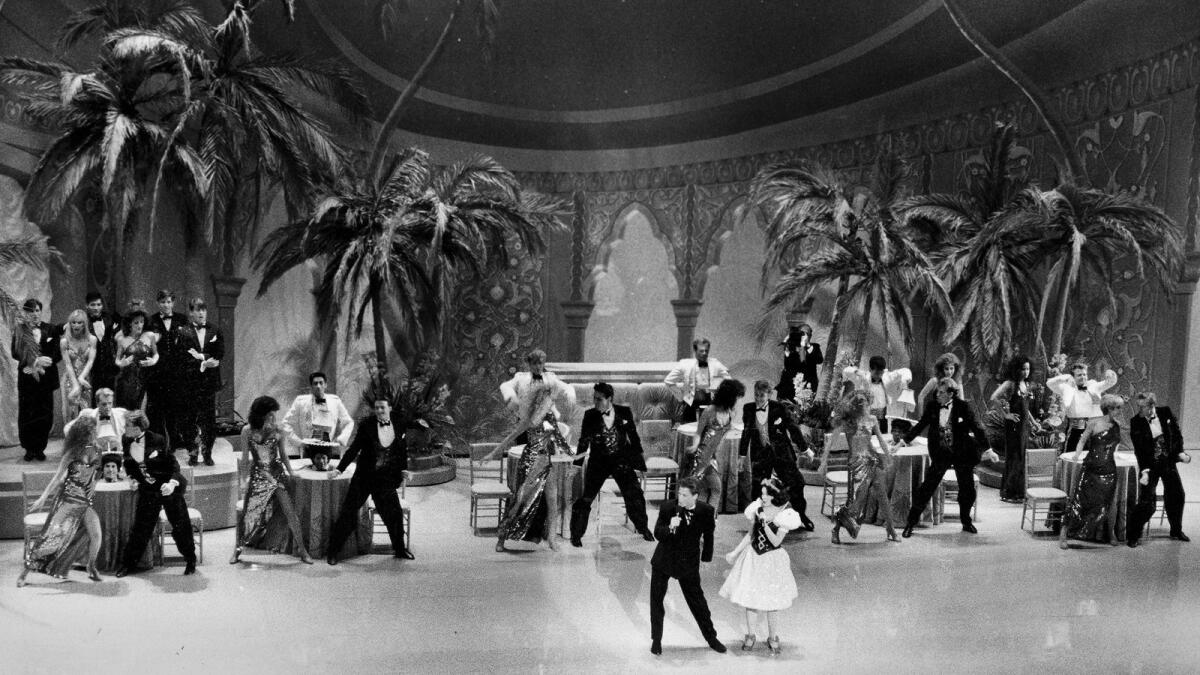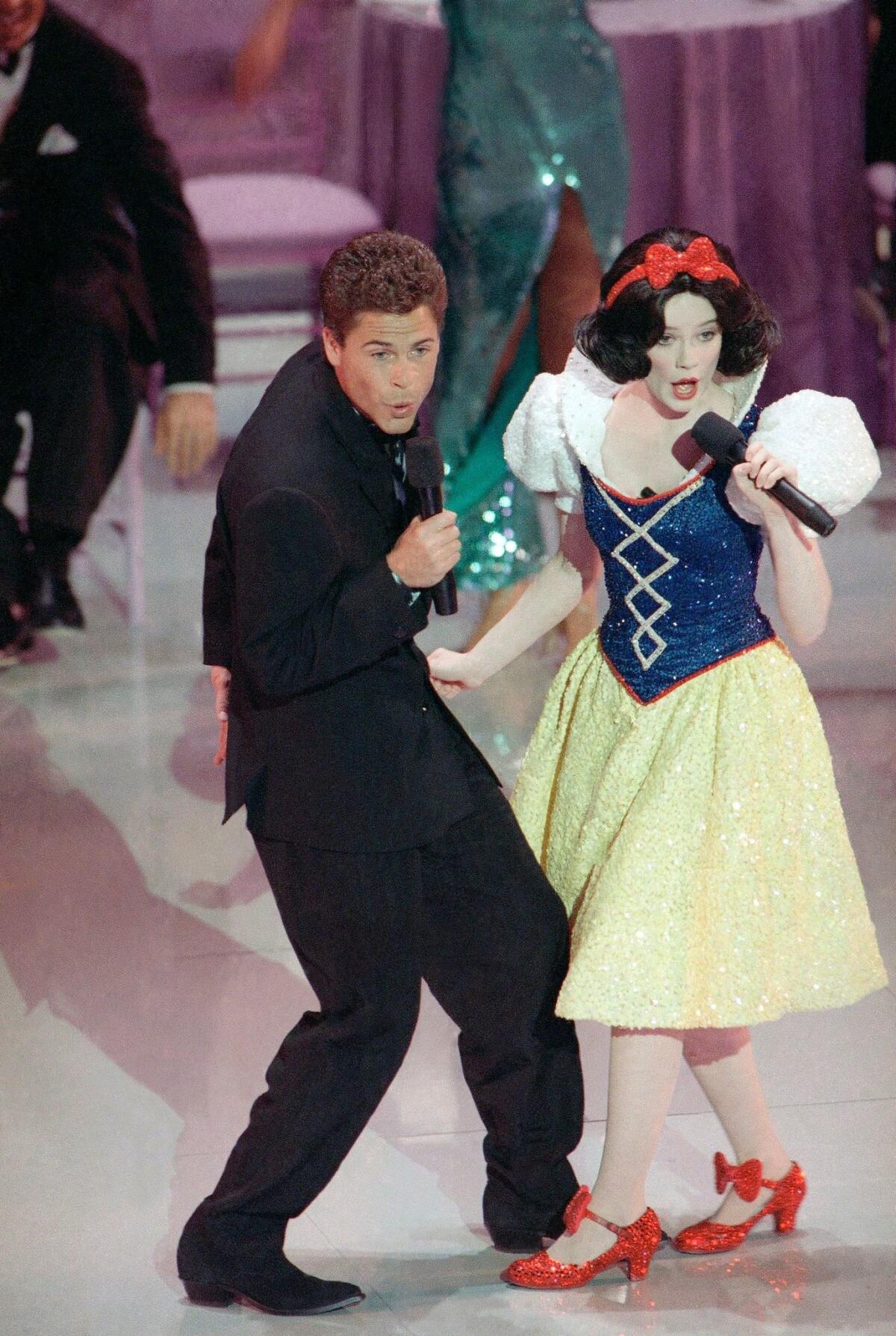From the Archives: Last time Oscars went host-less, it drew high ratings — and protests

- Share via
Editor’s note: This year’s Oscars telecast has been plagued by turmoil over the academy’s attempt to make a brisker ceremony. And after comedian Kevin Hart backed out as host of the ceremony, the Oscars will go hostless — the first time since 1989. After that year’s hostless ceremony, which was an attempt to appeal more to TV audiences than the film community, ratings were high but the academy faced protests afterward from movie makers and others. Nina J. Easton wrote about the fallout on April 29, 1989, in a piece called “Academy Steps In to Review Oscar Ceremony.”
In the days before this year’s Academy Awards telecast, producer Allan Carr predicted his show would be “10% for the town and 90% for the world.” The world responded that night, giving the show its highest TV ratings in five years. Hollywood has been responding ever since, with markedly less enthusiasm.
The fallout from the March 29 telecast has prompted the Academy of Motion Picture Arts and Sciences to take a hard look at its annual awards ceremony. At a closed meeting last week, the academy’s 36-member board of governors formed a committee to examine this year’s telecast and make recommendations about future shows.
Although the board’s action is not unprecedented, it is unusual. Historically, the board of governors has had minimal involvement with the ceremony, giving the academy president free rein to handpick a producer for the evening.
“For the first time, the board of governors is really going to take a hard look at what the show is going to be,” said Samuel Goldwyn Jr., an academy governor who produced last year’s show and one of a dozen members on the new committee.
While Carr received some enthusiastic responses from “the town” after his show, many studio executives, actors, film makers and others in Hollywood echoed critics like the New York Times’ Janet Maslin, who said the show’s opening number deserved a “permanent place in the annals of Oscar embarrassments.”
Why do the Oscars run long? We analyzed 10 shows and this is what we learned »
The criticism from Hollywood seemed to center on the show’s ambitious musical numbers and the appearance of personalities known more for their work in television than their work in film.
The production reflected the personal taste of Carr, who has produced such films as “Grease” and won a Tony Award for his Broadway production of the musical “La Cage aux Folles.” Carr declined to be interviewed for this story.
Others complained that the academy suffered needless embarrassment when the Walt Disney Co. filed a lawsuit charging unauthorized use of its Snow White character in an opening song-and-dance routine. The suit, filed the day after the program, was dropped a week later when the academy publicly apologized.
“There was a lot of unhappiness with the show,” said one source close to the academy.
General grumbling about the telecast was formalized earlier this month when a group of 17 prominent film makers and actors lent their names to a letter of protest calling the awards show an “embarrassment.”
For the first time, the board of governors is really going to take a hard look at what the show is going to be.
— Samuel Goldwyn Jr., an academy governor in 1989
“It is neither fitting nor acceptable that the best work in motion pictures be acknowledged in such a demeaning fashion,” the letter, sent to each of the academy governors, said. The protest was a topic of conversation at last week’s board meeting.
Academy president Richard Kahn attributed much of the criticism to the advance exposure the show received. “It was the most widely publicized and promoted show in history,” he said. “That puts your chin out front and invites people to take a swing at it.”
But Kahn defended the Oscar show, noting that reaction to the telecast among those in the industry was not overwhelmingly negative, just polarized. “People either liked it very much or they disliked it very much,” he said.
Those who lent their names to the protest letter included Gregory Peck, a former academy president, and two former producers of the show, Stanley Donen and Larry Gelbart. The others included Julie Andrews, Stanley Donen, Blake Edwards, John Foreman, Sidney Lumet, Paul Newman, Alan J. Pakula, Martin Ritt, Mark Rydell, Billy Wilder and Fred Zinnemann.
“What we’re responding to is a free-floating sense of dissatisfaction about the overly glitzy nature of the show,” said producer David Brown, one of the few signatories willing to comment on the letter. “The not-so-sweet smell of excess is what it’s all about.”

Another signatory, director Joseph L. Mankiewicz, pleaded for “a little more quiet, a little more class. ... They couldn’t make up their minds whether they were honoring TV excellence or film excellence.”
Writer Peter Stone, who also lent his name to the letter, called the show “tawdry and embarrassing,” and complained about the “forced banter” between the presenters.
But Kahn noted that while some people disliked the sometimes gossipy chitchat between the celebrity couples that Carr painstakingly brought together for the show, others loved it.
“They thanked us for giving them a look into the personalities of the people making the presentations,” Kahn said. “These were wonderful examples of screen personas come to life.” Even those in Hollywood critical of the show acknowledged Carr’s effort in putting the massive production together.
Gilbert Cates, who is chairing the academy committee examining the Oscar show, said the unpaid position of show producer “is a thankless job.” He added, “You can’t have a show without a lot of people who love it — and a lot who disagree. Every Academy Award show has gotten a variety of responses.”
“We are theoretically here to honor achievement in film,” said Goldwyn, who won an Emmy Award for last year’s Oscar production. “On the other hand, you need to attract a big audience to support the academy. So what do you do?” The show is the academy’s principal source of financial support.
See the most-read stories in Entertainment this hour »
More to Read
Only good movies
Get the Indie Focus newsletter, Mark Olsen's weekly guide to the world of cinema.
You may occasionally receive promotional content from the Los Angeles Times.









